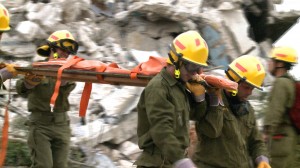Every year the Israeli Defense Force (IDF) carries out a weeklong series of emergency preparedness drills in which the citizens of Israel are encouraged to participate. I’ve often wondered how the average Israeli copes with the intrusion of sirens and drills inter-woven through the fabric of life in Israel.
School children know the procedure well. When the air raid siren sounds, they quickly head toward the protected area. They have 90 seconds to get there. For the students of Dugma Uziel Boys School of Jerusalem it is the bomb shelter beneath the school yard that consists of three crowded rooms colorfully decorated by the students themselves.
“We tell them that it is not a real war and they have to relax. We want them to practice because we want them to be ready,” said former principal Zvi Neeman. “They have you try their best … we know it is hard to be in [the bomb shelter].”
Surrounded by openly hostile nations, the Jewish State is simply not willing to take chances. It has been actively and strategically training its citizens with war preparedness exercises. And along with the experience Israel has gained from the past six decades of conflict, these drills have given the IDF confidence that Israel is more fortified and prepared for war than at any other time in history.
“We gain from every conflict or operation,” contends Lt.-Col. Avital Leibovitz, IDF spokesperson. “The forces that we have today are better prepared – better trained. We put a lot of emphasis on urban warfare, and therefore I think we are in a very different place [then in the past.]”
In 2008 I witnessed an emergency response to a simulated direct hit of a ballistic missile to a residential area. Using soldiers and dummies as mock victims, the IDF and first responders practiced their emergency skills when a building situated in the Jerusalem core – a stone’s throw from the Israeli Foreign Ministry – was used as a test site.
In May 2010 I traveled to Haifa to observe a simulated chemical terrorist response drill at the Rambam Health Care Campus, world renowned for its leadership in the treatment of trauma.
“We prepare for any kind of mass casualty scenario such as chemical, radiation and biological,” said Major Aviv Ohana, of the medical department of Israel’s Home Front Command. “We’ve been doing this for many years and we hope that we don’t [have a war] – just drills.”
Military leaders and observers from around the globe are routinely invited to learn from the Israelis.
“I work at US Northern Command in Colorado, and we…protect the homeland in the United States…chemical, biological – I oversee that for all of Northern Command,” said Lt.-Col. Edward Locke, Seaborne Branch chief.
When I asked if the U.S. was learning from the Israeli drill, Locke was quick to respond. “Absolutely,” he said. “[Israelis] are very efficient in what they do. They certainly have a higher threat than [the U.S.A]…. [I am] definitely very impressed by their resilience.”
So noteworthy was the Israeli mass-casualty chemical exercise at Rambam Health Care Campus that four-star general Craig R. McKinley, chief of the National Guard Bureau – a man who oversees half a million military personnel – was on hand to observe the drill.
As Israel continues to fortify itself and use past experiences to its advantage, Israelis are being trained to be ready. Though most Israelis take the drills in stride, I have noticed an underlying vigilance. This is the turbulent neighbourhood of the Middle East and anything can happen.
Marney Blom, Acts News Network, Jerusalem
Copyright © Acts News Network, Inc.

